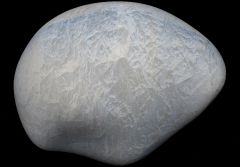Pan
Jump to navigation
Jump to search
Pan is the innermost moon of Saturn. It orbits inside of the Encke Gap in Saturn's w:Rings of Saturn#A Ring acting as a shepherd keeping the Encke Gap clear. Pan was imaged by Voyager 2 during its flyby of Saturn in 1981. Pan was predicted by Jeffrey N Cuzzi and Jeffrey D Scargle in 1985 based on the characteristics of the gap, then was found in a number of images.
Pan in Orbiter
Pan was introduced to Orbiter with the release of isaturn.zip in 2002.
| Add-on | Source | Version | Author | Type | Release Date | Compatibility | Wiki article |
|---|---|---|---|---|---|---|---|
| Minor moons Jupiter Saturn | O-F Resources | 2014-07-12 | T1234 | Scenery | 12 July 2014 | ||
| The Outer Planets 060929 Base | AVSIM | Rolf Keibel Carl Romanik Tony Dunn |
Scenery | 30 September 2006 | Orbiter 2006-P1 | ||
| The Outer Planets 050329 Update | AVSIM | 050329 | Rolf Keibel Tony Dunn Carl Romanik |
Scenery | 30 March 2005 | ||
| The Outer Planets 050125 | AVSIM | 050125 | Rolf Keibel Tony Dunn |
Scenery | 26 January 2005 | Orbiter 2005-P1 | |
| Inner Moons of Saturn | AVSIM | Rolf Keibel | Scenery | 15 October 2002 | |||
See also
Gallery
Pan as seen by Cassini on 7 March 2017
from Wikimedia Commons
| edit The Solar System | |
|---|---|
| Central star |
Sun (Sol) |
| Planets |
Mercury - Venus - Earth - Mars - Jupiter - Saturn - Uranus - Neptune |
| Natural satellites |
Moon - Phobos - Deimos - Io - Europa - Ganymede - Titan - more... |
| Add-ons |
Planets - Dwarf Planets - Small objects - Natural satellites - Alternative star systems |
 | This natural satellite related article is a stub. You can help Orbiterwiki by expanding it.
|





